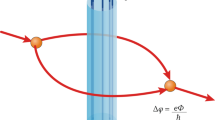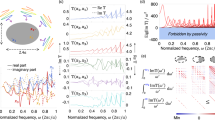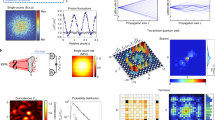Abstract
Sir C. V. Raman and T. M. K. Nedungadi have discussed in NATURE of January 27 a remarkable series of photographs showing the spectrum of monochromatic light scattered in a quartz crystal at various temperatures up to 530° C, not far from the transition point at 575° C. Their results are of special interest to me because they serve to confirm my opinion that, at any transition temperature (including the melting point), some kind of resonance occurs between two frequencies which characterize the two phases concerned. In other words, the transition takes place when there is close agreement between a frequency characteristic of the first phase and another frequency characteristic of the second phase. Since resonance may occur when this agreement is not quite exact, an explanation is possible of the fact that for many substances the setting point is not quite the same as the fusion point.
This is a preview of subscription content, access via your institution
Access options
Subscribe to this journal
Receive 51 print issues and online access
$199.00 per year
only $3.90 per issue
Buy this article
- Purchase on Springer Link
- Instant access to full article PDF
Prices may be subject to local taxes which are calculated during checkout
Similar content being viewed by others
Author information
Authors and Affiliations
Rights and permissions
About this article
Cite this article
ALLEN, H. The α, β Transformation of Quarts. Nature 145, 306–307 (1940). https://doi.org/10.1038/145306b0
Issue Date:
DOI: https://doi.org/10.1038/145306b0
Comments
By submitting a comment you agree to abide by our Terms and Community Guidelines. If you find something abusive or that does not comply with our terms or guidelines please flag it as inappropriate.



